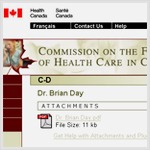
Dr. Brian Day
@DrBrianDay 
- Past President Canadian Medical Association
- Past President Arthroscopy Association of North America
- Honourary Associate Professor University of British Columbia
- 2014 Doctors of BC Don Rix Leadership Award


Commision of the Future of Health Care in Canada
Summary of Recommendations
Brian Day, MD
1. De-politicize the debate
Solutions should be based on what is best for the “consumer” - the citizens who fund the system, and the patients who are served by it. De-politicize issues by assigning responsibility for some of the potentially unpopular decisions to small or even single person task forces that can make reasoned and objective recommendations.
2. Repeal the Canada Health Act (CHA).
This Act was based on principles formulated 37 years ago. The only one of the 5 being conformed to today is the fifth, namely “public administration”. Universality is a concept that discriminates against lower socioeconomic groups, and Comprehensiveness has reduced access to essential services in order to cover less “medical necessary” treatments.
3. Eliminate global budgets and reward productivity
Until funding is tied to productivity and patient care, health care administrators will not make patient care a priority. While some global funding is necessary, hospitals should receive remuneration based on patients treated and productivity. Procedures should be accurately costed out and third parties (private pay, WCB, ICBC, RCMP, armed forces etc.) billed appropriately.
4. Incorporate business methods (SP, ROI)
Hospital boards complain about not receiving confirmed budgets in advance of their fiscal year. They should be required to submit strategic plans and a proposed budget based on prior years They should justify, based on increased productivity and efficiency, any increase funding requests. Their complaints (in BC, for example) that the recent announcement of a freeze in funding equates to a reduction is an indication of their expectation of “built in “ inflation and underlines a lack of budgeting and fiscal management skills. Information technology is at a primitive stage of development in our hospitals. Electronic medical records will eliminate major costs. Bill Gates has estimated that 30% of all health care costs are spent on paperwork.
5. Increase privatization and contracting out
Notwithstanding quotes of ill defined and statistically invalid “studies”, experience of contracting out has been shown to reduce costs, and lead to savings both in direct costs, and in the improved business methods that public sector is forced to incorporate when they embark on such efforts. (See Swedish experience, and Lions’ Gate locally).
6. Introduce competition, choice and accountability
Hospitals that compete with one another, and with the private sector, will become more efficient. Eliminate redundant services that are expensive and duplicate those available elsewhere – unless they are revenue positive (outpatient labs, outpatient physio, x-ray, etc).
7. Massively reduce bureaucracy.
In the mid-70’s, Vancouver Hospital was run by a single chief administrator (Dr. Ranta) with “hands on” front line managers. There are now at least 4 levels of bureaucracy between them and the CEO, and virtually all of these could be eliminated. This would achieve immediate and dramatic savings in costs, not only in their salaries, but also in the major expenses they generate. Each hospital should submit a proposal reducing their administrative component – especially middle and higher management - by at least 80%. Regional Health Boards are too political, as well as being wasteful, inefficient and poorly run. Similar criticisms apply to government administrative structures in health care.
8. Reduce influence of public sector health unions
They have fought innovation and change. Their negative influence on progress and their propaganda machinery have helped to create the present crisis. Agreements that are responsible for their excessive power should be revised to eliminate that control.
9. Accept economic reality, and introduce user fees
All industrialized nations have user fees. We have them in various forms already. They reduce abuse of the system, and there is no evidence that they have any effect on health care outcomes. At least 50% of all emergency room and doctor visits are probably not necessary. This is a very conservative estimate. The “poor” could be exempted. In the experience of many doctors, the majority of abuse of the system is by middle and higher income groups. With respect to emergency rooms, the legal impediment of the CHA can be addressed through wording that makes non-emergency visits not “medically necessary” – a definition that is within the domain of the Provinces.
10. Rank “core services” and deinsure unnecessary services
A public forum cannot do this – it was tried, and failed, at the 1999 Alberta Health Summit. In Oregon, the public ranked desirable (e.g. cosmetic surgery) above medically important services. Citizens will not voluntarily give up a privilege or service they already have. It is difficult for politicians to carry out this process, and responsibility should be assigned to a small task force (2 or 3 physicians) that will define those “medically necessary” services that are most important and that we should attempt to fund. This would depoliticize the effort and reduce the public outcry that would occur in response to decisions not to fund less necessary services. I estimate that 25% of all services in most of the sections in the medical services fee guide could be eliminated. Examples include bunions, varicose veins, breast reductions, nose reconstructions, high risk sports injuries, hospital dentistry, massage therapy etc. A simple letter from a doctor stating that a service was “medically necessary” would render such services as eligible for coverage. Private health insurance should be “de-criminalized” – it is presently made illegal by a provincial law. There is a manpower problem, partly due to an exodus of talented health care workers. With deinsurance, there will be an increased private sector component for nurse and physician remuneration, which will help recruitment and retention, and lessen the burden on the taxpayer. Without other measures, increasing the size of medical and nursing school output is an inefficient and illogical response to our failure to retain our current graduates. Government cannot afford to fund a large increase in doctors’ fees and hospital resources and equipment that would help retain them. Experts, who in the past have advised governments to cut back medical and nursing schools, are now being paid again to explain why they were wrong. We must choose our “expert” advisors more wisely.